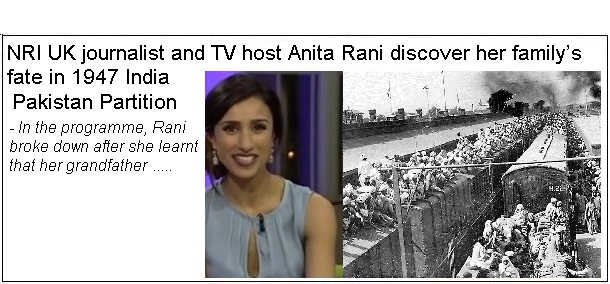| Connecting
over 25 millions NRIs worldwide |
|
|||||||||||||||||||||||
|
||
Indian-origin journalist discovers family’s fate during partition
London, Sep 13, 2015: Well-known journalist and TV host Anita Rani was reduced to tears during a BBC programme after discovering her family’s fate in the violence that consumed India after the subcontinent’s partition at the end of British rule in 1947, a media report said. The “Strictly Come Dancing” star came to know that her grandfather lost his first wife and a daughter in the post-partition conflict during BBC1’s “Who Do You Think You Are?”, a TV series in which celebrities trace their ancestry, discovering secrets and surprises from their past, Daily Mail online reported on Sunday. In the programme, Rani broke down after she learnt that her grandfather Sant Singh’s wife Pritam Kaur died after falling to the bottom of a well. Singh was a soldier in the Anglo-Indian army and powerless to defend his family as he was stationed 1,000 of kilometres away. Rani was even more shocked to learn that Pritam and Sant had a seven-year-old daughter who also died in the bloodshed. “Nobody in my family talks about the daughter. Nobody knows this. I don’t know what I am going to do but this has changed me,” she was quoted as saying in the show. Rani, who has a broadcasting degree from the University of Leeds, was born in Bradford to a Sikh mother and Hindu father and began her career at the tender age of 14 on the city’s Sunrise Radio. She has worked as a presenter on Channel Five, Sky Sports, Channel Four, BBC Two, BBC Three and BBC Asian Network…….IANS -------------------------------------------------- . Partition history as lived experience
Back in 1947, Pakistan’s founder Muhammad Ali Jinnah sent Indian author Khushwant Singh a message to stay on in Lahore and become a High Court judge, an offer the latter declined and decided to move to Delhi. “I drove on a totally empty road, blank road, all the way to Delhi. I didn’t see a soul till I reached Delhi,” he told Manleen Sandhu before his death in March 2014 relating his personal experience of Partition. “Jinnah sent a message to me through my father — he was his friend — to stay on in Lahore and become a High Court judge. I was a lawyer,” he said. “Bad times. No humanity at all ... After Partition I returned to Lahore many times. I had no venom against anyone,” he said shaking his head as he explained his decision to move amid the escalating violence. Khushwant Singh’s story is among the nearly 2,000 filling over 4,000 hours of video recorded by citizen historians like Ms. Sandhu, 21, for the 1947 Partition Archive. What began as a small grassroots effort to preserve the disappearing memory of Partition, at the University of California at Berkeley in 2011, has quickly spread across the globe to 157 cities where Partition witnesses reside. Young, tech-savvy citizen historians train to record oral histories and spread out in their communities with their phones or any other recording device as part of what has become the largest known oral history collection of South Asian memories. Today a majority of the stories come from India, Pakistan and Bangladesh, though many pour in from the diaspora spread across Europe, North America, West Asia and Australia. They are telling of how far refugees scattered in search of a stable life following Partition. --------------------------------------------------------------------
On 15 August 1947. "Partition" was the division of:· The Bengal province of British India into East Pakistan and West Bengal (India) · The Punjab Province into Punjab (West Pakistan) and Punjab, India · Also to the respective divisions of other assets, including the British Indian Army, the Indian Civil Service and other administrative services, the railways, and the central treasury. In the riots which preceded the partition in the Punjab region, between 200,000 and 500,000 people were killed in the retributive genocide between the religions. It is estimated that 14 million Hindus, Sikhs and Muslims were displaced during the partition; it was the largest mass migration in human history. ……..NRIpress-Club
|
||
| |
|
|


